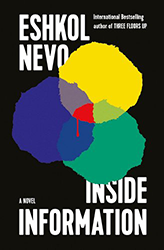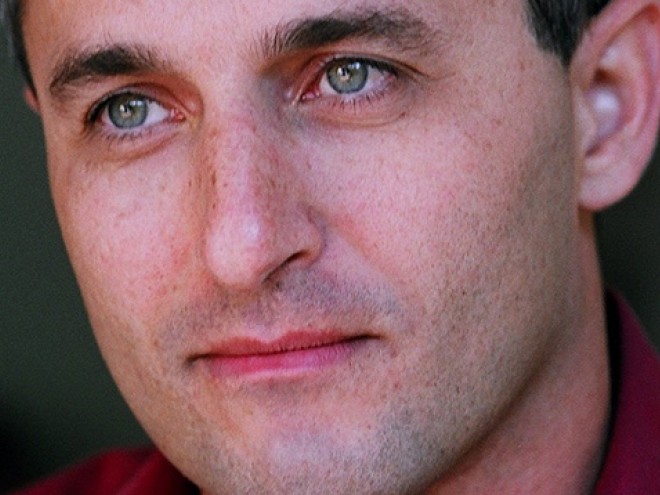Set at the time of the Rabin assassination, this intimate story revolves around Amir, a psychology student, and his girlfriend Noa, who studies photography. They’ve decided to try living together in an apartment in the small town of Ma’oz Ziyon, west of Jerusalem. Through them we meet their landlords, who live next door; a neighboring family whose older son was killed in Lebanon; and a Palestinian who is working on the renovation of a house down the street.
Interview
London’s Independent newspaper, in its review of Eshkol Nevo’s novel Homesick, declared that the author “takes his place with Amos Oz and A.B. Yehoshuah.” Homesick, a best-seller when it was published in Israel in 2004, is his first book to be translated into English. Nevo spoke with Jewish Book World’s Bob Goldfarb at a café in Tel Aviv.
Bob Goldfarb: There are a number of times in Homesick when events in the outside world are uncannily paralleled in the lives of your characters.
Eshkol Nevo: The original title of the book, when I submitted the manuscript, was “Osmosis.” The reason is because of the way in which reality and events in society— violent events, terrorist events, political change — are osmosing into the cell of private life. It’s a very delicate process. If there’s a long period of time in which a society becomes more and more pessimistic, full of anxiety, it has to osmose into private life.
BG: When a water heater explodes, your characters imagine it might be a Scud missile or a terrorist attack.
EN: In a normal place, when a water heater explodes you don’t think it’s a terrorist attack. But when you’re used to the sound, to being on alert, you interpret outside information differently. You remember it because it became significant afterwards. When the boiler explodes, afterwards they see this as a prophecy.
BG: You seem to love all your characters, the way God loves all His creations.
EN: I have to love them, but not be in love with them. I have to find something to love in every character or I couldn’t spend time with them — and I have to spend a lot of time with these people. Maybe this is the way I look at the world. I try to see their beauty, and I try to see where they are pathetic.
BG: Two minor characters are involved in an exorcism, where a chacham [shaman] drives an evil spirit from one of them. It’s as if the supernatural is their only recourse when they become desperate.
EN: I don’t think it’s always an act of despair. I have a lot of respect for the supernatural, the whole element of the not-completely-rational of life. You have this whole industry of kivrei tzadikkim [visiting the graves of holy men and women]. You can ridicule it, you can say it’s primitive, but there’s something about people devoting themselves in this moment. I think it’s very rooted in Jewish tradition, this respect for things you can’t see.
BG: From time to time you comment on the narrative by inserting the lyrics of songs by a fictional band. You seem to have a strong feeling for music. EN: I have a romance with music. I wanted to be a musician when I was younger, but I was not talented in any way — piano, guitar, drums. So I try to make music in my writing. It’s a symphony in a way, with voices that come together, and peak, and come apart. Maybe this is what distinguishes good writers: the musical aspect of prose. One of the “songs” in Homesick became a real song. Sivan Shavit released it to the radio. And in the last few months two more of my songs were released — David Daor’s CD includes one, Ronit Roland has another.
BG: How long have you known that you wanted to be a writer?
EN: This is not the life I imagined. I’m still surprised by it, by the fact that I don’t have to go to the office in the morning. I worked in advertising for 10 years, and I didn’t want to imagine that this is what I would be doing. Then I quit my job, wrote Homesick, and made a living teaching. It’s now been 8 years, and I’m still trying to figure out this strange life. I’m not a misanthrope, so how did I find myself in this lonely profession? I’m still wondering about it. It’s still a mystery. I’m bewildered.
BG: As a teacher, what do you tell your students about writing?
EN: I feel very close to my students. I’m still fighting with my demons myself, afraid of taking the wrong turn, so I identify with them. It’s a very brave thing to be an artist, especially in Israel. You can’t make a living out of it here — only a very, very few people do it. Where does it come from? I’m still trying to understand that.
BG: When you travel outside Israel, do you feel homesick?
EN: When I got an award in France, I said that this place I come from, it has troubles. We don’t even know where the borders are. But it’s home.
I was in Berlin a month ago. I like the city, my books are accepted wonderfully, I have friends there. Then I wake up and I find a text message “Have you heard what happened?” I turn on CNN and watch — it was the day of the flotilla incident. You can’t escape it.
I don’t know if it’s about loneliness, but it’s about having a place. When I ask how many people live in the town where they were born, I get maybe five hands out of sixty. Not only Israelis are homesick. Homesickness has become a global phenomenon.
Bob Goldfarb is President Emeritus of Jewish Creativity International.





